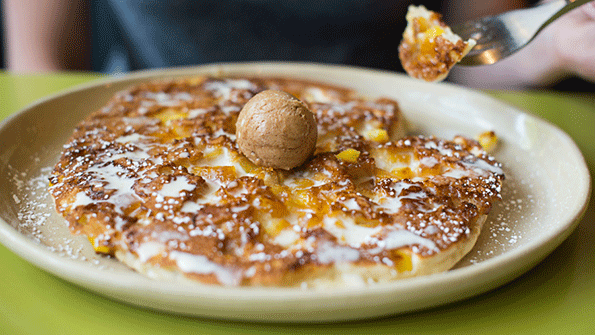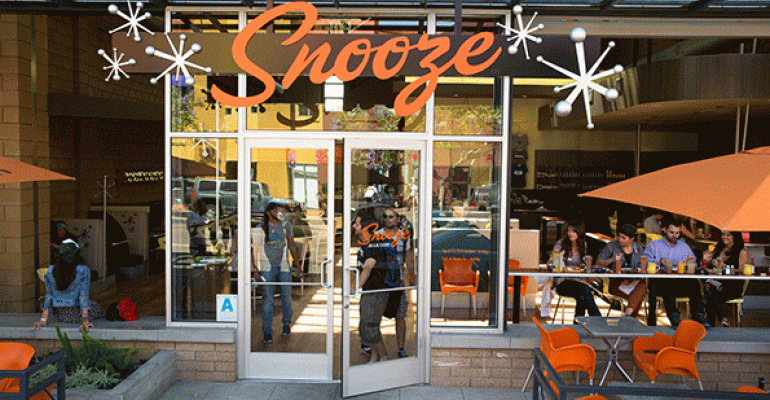
The 2016 UCLA Restaurant Conference, held in April, featured a fascinating session with Erik Oberholtzer of Tender Greens, Adam Schlegel of Snooze: An AM Eatery and Mario Del Pero of Mendocino Farms. I spoke with each of these inspirational restaurateurs in depth to explore the “who” and “how” behind the “why” of their businesses. In this installment, I speak with Schlegel, co-founder of Snooze, about championing sustainability.
Adam, tell us about Snooze.
Schlegel: In one word, it’s energy. Snooze is bright and warm, and the music is fun. With Snooze, we have the unique opportunity to open at 6:30 in the morning and be a part of everything that’s great about restaurants and hospitality, and we even manage to offer a happy hour — all before we close at 2:30 p.m.
Our restaurants are located in diverse neighborhoods, in college towns, agricultural towns, cities and suburbs. It’s fun to visit different Snoozes in different locations and still feel the same energy and vibe, while being in a very unique restaurant every time. Breakfast marks the beginning of a new day, and we believe life is for living and celebrating — and making a difference.
Breakfast and happy hour, all in the same time frame? Tell us more about what sets Snooze apart.
Schlegel: Yes. Our menu is probably best described as brunch in that aspect. Our guests eat breakfast at 7 in the morning, and they also like our breakfast meals at 1:30 in the afternoon. We serve traditional breakfast as we have known it, but with a really great twist — with a story behind every menu item and ingredient. We know our bakers, our farmers, our growers, and we’ve spent time with each of them. We take a lot of pride in that.
One example is the sausage we use. It comes from people who actually went to our same high school, and we’ve worked with them for nearly 10 years to develop not only our flavor, but also ensure it meets our standards when it comes to the ethical treatment of animals. We really try to make sure each ingredient we use is the very best — and each ingredient has a story behind it, and each meets our values.

Where did those values come from?
Schlegel: My brother and founder of Snooze, Jon, and I are really big travelers. And in our travels, we observed how the rest of the world eats, and that had a big impact on us. Our travels became an exploration of where food comes from and food’s affect on culture and on health. For us, with that deep understanding, we have a responsibility as restaurateurs to our guests.
That brings us to your “why” — tell me more.
Schlegel: Our “why” is two-fold. My brother Jon really came up with the whole idea and concept for Snooze. A lot of that spurred from his love of the hospitality industry. He was with Hyatt and then worked with a few highly regarded restaurants in Denver. He wanted to open his dream restaurant that brought culinary innovation and an energetic atmosphere to breakfast, and I wanted to help.
I have a degree in finance and spent seven years as a consultant for KPMG and travelled all over the globe, working in incredible locations. Jon put together a business plan for Snooze, and we worked together to make it happen. Like Jon, I fell in love with food and the restaurant industry, and so I spent a lot of my time developing the business while my brother was able to really focus on the restaurant and what we do there.
So, the “why” for my brother is providing an exceptional guest experience. My “why” is that I wanted to create a new business taking into account the ecology of it all, meaning we are thinking of the people, the climate, health and the profit all in the same mantra.
One of my favorite parts of Snooze is that it’s way bigger and beyond Jon or myself. Truly it’s been shaped by everyone who works there, every one of our guests. David Birzon, our CEO, has done a wonderful job of developing these traits with new energy and ideation. We just put a drop in the pond.

Sustainability efforts
Yes, you are definitely a champion for our environment. Tell me how you move your sustainability efforts forward within your company, within your team and with your guests?
Schlegel: I really do love the “12 Months of Green” because it provides a framework for helping our team and guests learn about sustainability. We created our “12 Months of Green” along with about 20 other sustainability-focused restaurants here in Denver. It was very much a community effort. Each month the topics change from issues like recycling to chemicals to compost to lighting.
This is an overwhelming subject, and I think it is for a lot of people in the industry, but if we can break it into baby steps and small victories, then we can really start to move the needle. So, every month, our team — we call them our “Snoozers” — gets together to talk about one of the 12 aspects that make a positive difference for our environment. It takes three weeks to make a habit, so it takes three weeks to do something new — something positive. Then in the next month, we move on to a new area, and that way in 12 months, we are making strides in becoming a more sustainable restaurant company.
Within each restaurant, we have Green Captains. Megan Jorgensen is head of our sustainability efforts and training. She trains our captains and Snoozers so that we ensure our people know the difference between compost, recycle and trash — they play the role of “trash police.” But they’re also out creating field trips for us to go visit school gardens and get our hands dirty and help students in our neighborhoods learn more about sustainability. Or they are planning a trip to the recycling plant or one of our local food providers. Every employee goes through a sustainability training program. Our initial training program, led by Megan, is “Sustainability 101,” and then after that, everything is centered around our “12 Months of Green.” It’s really helped us to develop future leaders and to be a leader in our communities.
Sounds like every restaurant needs a Megan. I love the training and education you provide. Tell me about the messaging to your guests about your sustainability efforts.
Schlegel: We have always been very conscious about not overdoing it or preaching. The best message probably comes from our menu, where we tell the story about sourcing and quality of ingredients. Megan — you are best to expand on this one.
Megan Jorgensen: I think the best way we communicate our dedication is by walking the talk. In our restrooms, we have high efficiency hand dryers instead of paper towels. We have reusable cups instead of disposable cups. Our employees say, “Can I compost that for you?” or “Can I recycle that for you?” instead of “Can I throw that away for you?” It’s a big part of our culture and the way we communicate with our guests even in subtle ways.

Do you find any confusion?
Schlegel: Food is probably the most overwhelming confusion. What is local? What is organic? It really can be hard to define these, and there’s so much ambiguity surrounding that terminology that it makes it really difficult. I also think sustainability can be a polarizing word. It almost gets into a left wing/right wing-like mantra instead of breaking it down to its element. We need to start thinking that real food is a win for everyone across the spectrum.
One comment you made at the UCLA conference was that sustainability and food quality shouldn’t be a competitive advantage. That’s a bold statement. So what do you recommend? How can the industry make a bigger impact?
Schlegel: I feel very optimistic that this is the direction we are going. Of the top 20 trends going on, according to Nation’s Restaurant News, 17 of them really have foundations in health, sustainability and where our food comes from. So fortunately, I think this is the future that our guests are really driving. Outside of that, I thought the UCLA conference was fantastic — we could have spent two days on sustainability. I want to help figure out how we can all work together and establish these concepts and focus on pushing this forward.
Say you leave Snooze and take over a 1,000-unit restaurant company with no sustainability practices. Where do you start? How do you scale what you’re doing now to that level?
Schlegel: That’s a great role-playing question. From a leadership standpoint, it will take an open transparency of saying that there’s a problem here, and directionally, this is where we want to go. As a leader of a large company, I would say in five years we are going to be one of the most sustainable companies. In the first year, we’re going to focus on water, electricity and food, and we’re just going to understand it. In two years, we’re going to start making changes. It’s not going to happen overnight, but sustainability is really the future of business.
So you are really saying first, be committed; second, learn the issues; and third, start making changes. It may be a multi-year process, but it will be worth it. Let’s return to the definition of local and organic. What is your definition?
Schlegel: Local for us is really in a 250-mile radius of our front door for each restaurant. While we would love to have as much organic produce as possible, for us, organic really comes down to verification of each individual farm. We use a lot of sustainable agricultural network verification when it comes to what great farming is. So our hope is that it doesn’t have any hormones, pesticides, herbicides, that our animals have no confinement and as much living room as they can, and artificial foods don’t have a home in any of our kitchens. Organic is wonderful, but I can tell you that our coffee farm that we’ve worked with since day one is not a certified organic farm, but it’s a biodynamic farm. It’s better than that. They just don’t have the $50,000 needed for that certification. But we’ve been there, and we have the whole story, and we’ve brought many people there to live with the family and understand it. For us, it is just that knowledge and direction we have with food.





